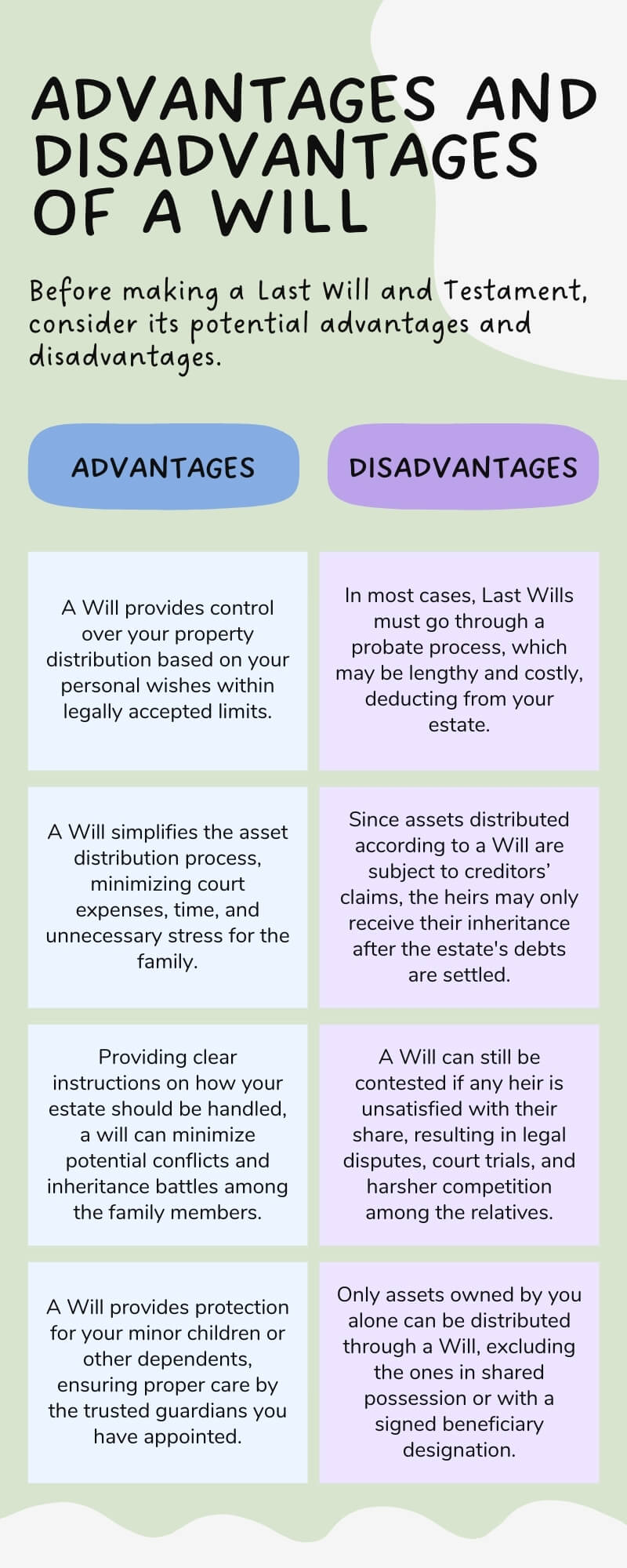The Last Will and Testament is an official legal document that states person’s final wishes concerning their possessions and various preferred arrangements in case of their death. It is an important estate-planning tool to guide the survivors on what to do after this individual passes away.
In simple terms, the Last Will and Testament may be viewed as a set of instructions concerning your property, assets, pets, and children after you die. In it, you may:
- Distribute your assets and debts among the heirs;
- Leave special gifts to certain people;
- Appoint guardians for the dependents and/or pets;
- Arrange charitable contributions;
- Specify any other arrangements.
The Last Will and Testament is not a mandatory document everyone must have, so you may choose not to write one. However, if you die intestate (which means “without a Will”), the state will distribute your possessions according to the local intestacy laws, which may not be considered fair by your heirs or even yourself.
So, if you want to take care of your loved ones in their grief after you die, making a Last Will and Testament in advance and updating it periodically as circumstances change is a good idea. The document will ensure property distribution in strict accordance with your specific preferences and give you a sense of control over this process after you pass away.
How to Make a Will for Free?

While an experienced lawyer or an online service can help you create an efficient, legally-binding Last Will for a certain fee, it is quite possible to do it on your own for free. Of course, considering the specificity of legal terminology and risks of negative implications in case of its misusage, the task may be quite challenging. Yet, as long as you are confident about your final wishes and do not have a lot of valuables, high net worth, or any controversial family situations, you may try to figure out its specifics and come up with your own Will.
Here are some useful recommendations if you want to do your own Will.
Research Your State’s Requirements
To do everything properly, start by researching your state laws and regulations concerning Last Wills. Make sure you understand who should sign the document, how many witnesses you need (if at all), and whether the Will must be notarized. If applicable, find out the validity of Wills prepared outside your state or concerning out-of-state property.
Download Last Will and Testament Template
A template can help you figure out an acceptable structure, form, and language conventionally used in a Last Will and Testament. Following a legally approved sample, you can draft your own document with more ease.
Unfortunately, it may be quite challenging to find a template of a free Will online, as official state or court websites do not generally offer any. However, you may be lucky to get a few from some credible and trusted websites and adjust them to your needs after extensive research.
List Your Assets and Beneficiaries

Before writing your own Last Will and Testament, make detailed records of all your possessions. List all your tangible and intangible assets, including personal property, land, real estate, money in cash and bank or online accounts, business bonds or stocks, vehicles, art pieces, etc.
Secondly, list your beneficiaries – individuals and/or entities that will receive your assets. Your list may include family members, friends, or other people you want to give any part of your assets to (like neighbors, colleagues, etc.), charitable organizations, churches, schools, universities, or any other institution you wish to donate something.
When both lists are ready, decide who gets what and designate your property to each beneficiary in the Will. It is important to understand that accounts with named beneficiaries, POD, jointly owned, or others with specific designations will be distributed as per the account specifications. You cannot bypass such designations through your Will – only by changing the account beneficiaries with respective organizations, such as banks or insurance providers.
Choose an Executor
An executor is a personal representative who will be in charge of following the instructions left by the deceased. In other words, they will carry out your wishes, settle your affairs, and manage the distribution of assets as outlined in the Will.
This person must be at least 18 years old, of sound mind, capable, and trustworthy, and agree to take on the responsibility of your personal representative. You may choose a family member, a close friend, a lawyer, or any individual you trust to execute your wishes. Mind that some states may have specific requirements as for this person’s qualifications and characteristics.
It is also good to choose a backup or a successor executor in case your first choice is unable to fulfill their duties due to changed circumstances like being out of state or country, mental health condition, or death.
Fill out a Will
Once you have all the details to include in your Last Will and Testament, you may formalize it on paper, as one of the main requirements in all states is that this document must be in writing.
If you have obtained a blank Will form, make sure it suits your individual situation and fill out the lines with the necessary information. If you only have a sample you believe is valid, write your own Will, following its language, terminology, style, format, and structure.
Sign the Will in the Presence of Witnesses

To make your final Will and Testament valid, in most states, you must sign it in the presence of two witnesses. After they see you signing the document, they must put their own signatures on it to testify to the soundness of your mind and the Will’s authenticity. In case you physically cannot sign the Last Will yourself, another person must do this in your presence and at your express request and direction.
Note that some states may have varying regulations or set additional requirements. For example, Louisiana is the only state that demands one additional signature of a notary public, while it may be the only one put on the Last Will in Colorado. Some states require witnesses to be uninvolved and disinterested third parties who are not included in the list of beneficiaries. Others recognize so-called “self-proving” wills that have a notarized affidavit signed by the witnesses attached to it instead of their signatures in the document itself.
So, before signing the document, research your state’s legal requirements to do everything properly.
Store Your Will Safely
The original of your Last Will and Testament must be stored in a place that is safe but easily accessible for the executor. Legal experts often recommend taking additional precautions in the form of a fireproof safe or lockbox or a bank safe deposit box to ensure Will’s longevity. Some courts allow storing Wills in special vaults, providing access only to the testator (a person who writes the Will), their attorney, and their executor until a person dies. Check if such a service is available in your area.
It is also advisable to make copies of your Last Will and keep them apart from the original. For example, you may give them to your attorney and executor or any other person you trust.
What to Put in a Will?

List everything you want your personal representative to do with your estate after your death, following the standard format and structure of a legal Will accepted in your state. Here are a few tips on what to put in it:
- The document should start with the title “Last Will and Testament” and your personal information. You should identify yourself by stating your full name and address specifying that you have completed this Will voluntarily while being in sound mind.
- Include a revocation clause that revokes any previous wills, provisions, codicils, and clauses.
- Introduce your executor – a person you have appointed to manage your estate and fulfill your wishes outlined in this Will after you pass away. You may also have a separate digital executor for your online accounts and a trustee if you establish a trust through your will. Be sure to mention the responsibilities and powers that your personal representatives will have.
- Name all your dependents and nominate legal guardians for each of them. Dependents may include children under 18 (or 21 in some states), elderly parents, a spouse, a sibling, or any other family member or other person reliant on your financial support. You may even designate guardians for your pets and provide compensation for their care.
- If you want to gift certain assets to specific people, create a separate section with a list and description of items, full names of people you want to gift them to, and conditions under which you are giving each gift, if any.
- A Last Will and Testament usually contains a residual clause that states how to distribute the remaining estate. You may choose a person or organization or multiple ones and describe the preferred distribution in equal or unequal shares. You may also want to put the remainder in the trust for the benefit of your children, ask for the distribution as per state laws, or choose other options you find suitable.
- In a lot of cases, it would be necessary to add a section with interpretations of terms you use and additional provisions. These may be a HIPAA release, a no-contest clause, intentional omissions, and other provisions you conclude are necessary to ensure your personal representatives can execute all their powers and the Will terms are followed to the fullest extent possible.
- The closing part of a Last Will and Testament is the testator’s declaration of drafting the document as a “free and voluntary act” and the date it was concluded.
- Finally, a Will must be validated with three signatures provided by the testator and two witnesses.

Download Free Printable Will Forms
You may try searching for free Will forms online on reputable websites, and you will likely find various different versions. Before downloading them for personal use, make sure they meet the basic requirements for Wills in your area and include the legal language that meets your needs and wishes.
If you want to create your own document, here is an example of a Will and Testament that can be followed:
Frequently Asked Questions

Is it legal to write your own will?
Yes, writing your own will without the attorney’s involvement is legal. Yet, you must ensure that this document meets all the legal requirements adopted in your state, including format, structure, language, the number of witnesses and signatures, notarization, etc.
What makes a will invalid?
The Last Will and Testament is considered legal and valid if it is written, signed, and witnessed, though specific rules may vary by state.
However, the Will may be recognized as invalid if it does not follow any legal regulation of a specific state, for example:
– The testator is younger than the legally acceptable age;
– The testator has no mental capacity to make any sound decisions concerning asset distribution and beneficiaries;
– The will was written involuntarily or under pressure;
– The document does not have the testator’s signature;
– The will is not signed by two legally acceptable witnesses.
Does a will have to be notarized?
Only a few states require the notarization of a Last Will, including Louisiana and Colorado. In other states, lawyers may recommend notarizing it for additional validation, even if it is not mandatory. However, the National Notary Association warns that a will may even be invalidated if it is notarized against the exact statutory laws of a particular state.
How much does a Last Will and Testament cost?
Your Last Will and Testament may cost from nothing to about $8,000, depending on your wishes and needs.
If you choose to write it on your own, it will not cost you anything. Only if the state laws require the document to be notarized, you will need to pay the notary public for their services, which usually cost from $5 to $30.
Online will-making services normally charge somewhere between $40 and $300 for creating a Last Will and Testament.
If you decide to hire a lawyer to help you draft your final will, your expenses may range from $300 to $8,000, depending on the attorney’s expertise, reputation, location, and fee structure (hourly or flat), as well as the complexity of your estate.
What happens if a will is not probated?
Each state has its own laws concerning the last will probate procedure and if it is necessary at all. While it is mandatory in some states, others may specify a particular estate value threshold that allows people to skip this step or offer certain methods of avoiding it. Similarly, the consequences of not probating a will if it is necessary may also differ. The most probable outcome is that the will may be considered invalid. The state may withhold and freeze assets, not letting the heirs get their shares. In other cases, it may lead to fines, increased taxes, and holding the executor liable for excessive expenses. It is best to research your state’s regulations and consult a lawyer to be on the safe side.


